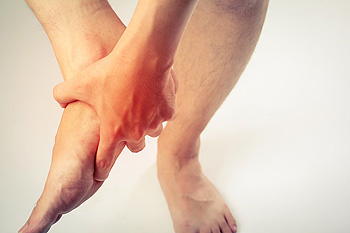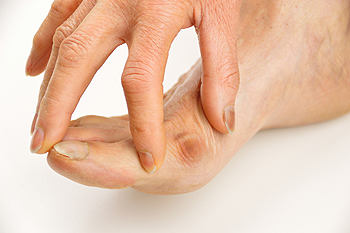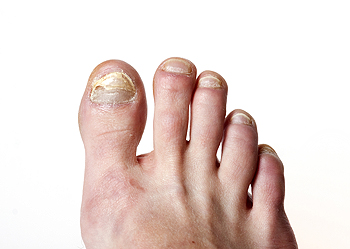Garner (919) 661-4150
April 2022
Causes of Foot Pain

Pain can be felt in the feet for a multitude of reasons, including aging, prolonged standing, walking, being overweight, structural problems with feet, foot injuries, poor fitting foot coverings, or a physical condition, such as arthritis or gout. Painful foot conditions can arise out of the aforementioned risk factors, like bunions, calluses, corns, hammertoes, Morton’s neuroma, plantar fasciitis, or heel spurs. If you are experiencing pain in your feet and you cannot easily figure out what it is from or what to do about it, consider consulting with a podiatrist for proper diagnosis and treatment.
Foot Pain
Foot pain can be extremely painful and debilitating. If you have a foot pain, consult with Chukwuma Ukata, DPM from Advanced Carolina Foot and Ankle Center. Our doctor will assess your condition and provide you with quality foot and ankle treatment.
Causes
Foot pain is a very broad condition that could be caused by one or more ailments. The most common include:
- Bunions
- Hammertoes
- Plantar Fasciitis
- Bone Spurs
- Corns
- Tarsal Tunnel Syndrome
- Ingrown Toenails
- Arthritis (such as Gout, Rheumatoid, and Osteoarthritis)
- Flat Feet
- Injury (from stress fractures, broken toe, foot, ankle, Achilles tendon ruptures, and sprains)
- And more
Diagnosis
To figure out the cause of foot pain, podiatrists utilize several different methods. This can range from simple visual inspections and sensation tests to X-rays and MRI scans. Prior medical history, family medical history, and any recent physical traumatic events will all be taken into consideration for a proper diagnosis.
Treatment
Treatment depends upon the cause of the foot pain. Whether it is resting, staying off the foot, or having surgery; podiatrists have a number of treatment options available for foot pain.
If you have any questions, please feel free to contact our office located in Garner, NC . We offer the newest diagnostic and treatment technologies for all your foot care needs.
Heel Pain Can Be Treated!
Various Causes of Heel Pain
Although plantar fasciitis (an inflammation of the plantar fascia ligament on the sole of the foot) is often the root of heel pain, it can come from a variety of other conditions as well. For instance, compression of the medial calcaneal nerve, which travels down the inner part of the ankle, can create a tingling or numb sensation in the heel as well as pain. In older adults, fat pads in the heel can wear down (fat pad atrophy) and cause pain. Systemic inflammatory conditions such as certain types of arthritis, Reiter syndrome, ankylosing spondylitis, and a common type of lupus (systemic lupus erythematosus) may sometimes be associated with heel pain. Sometimes tiny nodules, or plantar fibroma, develop on the plantar fascia which can cause pain in the arch near the heel. To have the cause of your heel pain properly diagnosed and treated, make an appointment with a podiatrist.
Many people suffer from bouts of heel pain. For more information, contact Chukwuma Ukata, DPM of Advanced Carolina Foot and Ankle Center. Our doctor can provide the care you need to keep you pain-free and on your feet.
Causes of Heel Pain
Heel pain is often associated with plantar fasciitis. The plantar fascia is a band of tissues that extends along the bottom of the foot. A rip or tear in this ligament can cause inflammation of the tissue.
Achilles tendonitis is another cause of heel pain. Inflammation of the Achilles tendon will cause pain from fractures and muscle tearing. Lack of flexibility is also another symptom.
Heel spurs are another cause of pain. When the tissues of the plantar fascia undergo a great deal of stress, it can lead to ligament separation from the heel bone, causing heel spurs.
Why Might Heel Pain Occur?
- Wearing ill-fitting shoes
- Wearing non-supportive shoes
- Weight change
- Excessive running
Treatments
Heel pain should be treated as soon as possible for immediate results. Keeping your feet in a stress-free environment will help. If you suffer from Achilles tendonitis or plantar fasciitis, applying ice will reduce the swelling. Stretching before an exercise like running will help the muscles. Using all these tips will help make heel pain a condition of the past.
If you have any questions please contact our office located in Garner, NC . We offer the newest diagnostic and treatment technologies for all your foot and ankle needs.
Why Fungal Nails Can Be Difficult to Treat
Fungal toenail infections are a common occurrence, particularly in people over the age of 70. This type of infection, medically referred to as onychomycosis, can embed itself within the multiple layers that make toenails as well as their underlying nail beds. This is one of the reasons why killing the fungus that causes the infection can be so difficult. Another reason is that the fungal organism is highly contagious and can live for months in the warm, moist environments it thrives in (locker rooms, communal showers, bathrooms, enclosed shoes, swimming areas, etc.). It can be transmitted easily onto bare feet, or by wearing wet socks or shoes, and from direct contact with someone who is infected. Nails that are infected by a fungal organism can become thickened, brittle, crumbly, discolored, deformed, and even painful. Depending on the severity of the infection, a podiatrist can use various methods of treatment to eradicate the fungus, prevent it from returning, and help the natural nail to regrow.
For more information about treatment, contact Chukwuma Ukata, DPM of Advanced Carolina Foot and Ankle Center. Our doctor can provide the care you need to keep you pain-free and on your feet.
Toenail Fungus Treatment
Toenail fungus is a condition that affects many people and can be especially hard to get rid of. Fortunately, there are several methods to go about treating and avoiding it.
Antifungals & Deterrence
Oral antifungal medicine has been shown to be effective in many cases. It is important to consult with a podiatrist to determine the proper regiment for you, or potentially explore other options.
Applying foot powder on the feet and shoes helps keep the feet free of moisture and sweat.
Sandals or open toed shoes – Wearing these will allow air movement and help keep feet dry. They also expose your feet to light, which fungus cannot tolerate. Socks with moisture wicking material also help as well.
If you have any questions please feel free to contact our office located in Garner, NC . We offer the newest diagnostic tools and technology to treat your foot and ankle needs.
What Causes a Bunion to Form?
 While the exact cause of a bunion is not always apparent, their bony disfigurement is hard to miss. Genetics are believed to sometimes play a role in the development of a bunion. Many consider gout and rheumatoid arthritis as a possible link to certain bunions that have formed, as well as abnormal foot structures such as flat feet, flexible joints, loose ligaments, and more. Tight, pointy high heels and other types of ill-fitting footwear may worsen a structural abnormality and increase the likelihood of a bunion forming. Standing for prolonged periods of time can also worsen bunion symptoms. Podiatrists deal with bunions every day and have various techniques for correcting them, depending upon how far along the deformity has progressed. Don’t delay in making an appointment with a podiatrist to have your feet examined if you have redness, swelling, soreness, an existing bony bump, or a bump that’s beginning to form at the joint of your big toe.
While the exact cause of a bunion is not always apparent, their bony disfigurement is hard to miss. Genetics are believed to sometimes play a role in the development of a bunion. Many consider gout and rheumatoid arthritis as a possible link to certain bunions that have formed, as well as abnormal foot structures such as flat feet, flexible joints, loose ligaments, and more. Tight, pointy high heels and other types of ill-fitting footwear may worsen a structural abnormality and increase the likelihood of a bunion forming. Standing for prolonged periods of time can also worsen bunion symptoms. Podiatrists deal with bunions every day and have various techniques for correcting them, depending upon how far along the deformity has progressed. Don’t delay in making an appointment with a podiatrist to have your feet examined if you have redness, swelling, soreness, an existing bony bump, or a bump that’s beginning to form at the joint of your big toe.
If you are suffering from bunions, contact Chukwuma Ukata, DPM of Advanced Carolina Foot and Ankle Center. Our doctor can provide the care you need to keep you pain-free and on your feet.
What Is a Bunion?
A bunion is formed of swollen tissue or an enlargement of boney growth, usually located at the base joint of the toe that connects to the foot. The swelling occurs due to the bones in the big toe shifting inward, which impacts the other toes of the foot. This causes the area around the base of the big toe to become inflamed and painful.
Why Do Bunions Form?
Genetics – Susceptibility to bunions are often hereditary
Stress on the feet – Poorly fitted and uncomfortable footwear that places stress on feet, such as heels, can worsen existing bunions
How Are Bunions Diagnosed?
Doctors often perform two tests – blood tests and x-rays – when trying to diagnose bunions, especially in the early stages of development. Blood tests help determine if the foot pain is being caused by something else, such as arthritis, while x-rays provide a clear picture of your bone structure to your doctor.
How Are Bunions Treated?
- Refrain from wearing heels or similar shoes that cause discomfort
- Select wider shoes that can provide more comfort and reduce pain
- Anti-inflammatory and pain management drugs
- Orthotics or foot inserts
- Surgery
If you have any questions, please feel free to contact our office located in Garner, NC . We offer the newest diagnostic and treatment technologies for all your foot care needs.









